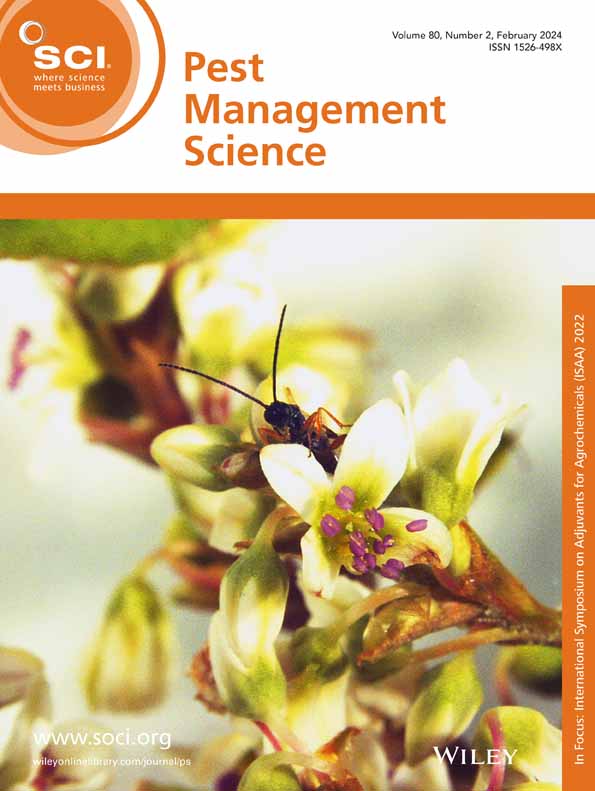农药-肥料互作:养分对小麦原硫康唑解毒的影响。
IF 3.8
1区 农林科学
Q1 AGRONOMY
引用次数: 0
摘要
背景:三唑类杀菌剂prothioconazole (PTC)及其代谢物prothioconazole-desthio (dPTC)在作物中存在潜在的植物毒性风险。然而,小麦对其吸收和解毒的机制尚不清楚。本研究旨在确定宏量营养素和内源信号化合物如何调节小麦幼苗对PTC的吸收和代谢。结果高钾有效度显著提高了PTC的摄取,与低钾相比,高钾有效度使PTC的摄取在12 h内增加了约600%。外源施用吲哚-3-乙酸和油菜素内酯导致PTC积累量分别显著增加121.7%和94.4%。转录组学分析显示,PTC激活了解毒途径,显著上调了三磷酸腺苷(ATP)结合盒转运体和丝裂原活化蛋白激酶(MAPK)信号传导成分。在缺氮条件下,1493个基因特异性下调,包括与核糖体生物发生、苯丙氨酸代谢和膜运输相关的基因,表明解毒能力降低,dPTC保留增强。结论氮素有效性在小麦对PTC暴露的分子响应中起关键作用。缺氮显著下调了参与解毒过程的关键基因,从而加重了ptc诱导的植物毒性。这些结果强调了营养状况与农药代谢之间的重要相互作用,为旨在减少粮食作物化学残留和提高农业生态系统可持续性的农药肥料综合管理策略提供了机制证据。©2025化学工业协会。本文章由计算机程序翻译,如有差异,请以英文原文为准。
Pesticide-fertilizer interactions: nutrient effects on wheat detoxification of prothioconazole.
BACKGROUND
Prothioconazole (PTC), a triazole fungicide, and its metabolite prothioconazole-desthio (dPTC) present potential phytotoxic risks in crops. However, the mechanisms governing their uptake and detoxification in wheat remain unknown. This study aimed to determine how macronutrients and endogenous signaling compounds regulate PTC absorption and metabolism in wheat seedlings.
RESULTS
High potassium availability markedly enhanced PTC uptake, resulting in a > 600% increase in PTC uptake over 12 h compared to the low potassium. Exogenous application of indole-3-acetic acid and brassinolide led to significant increases in PTC accumulation by 121.7% and 94.4%, respectively. Transcriptomic analysis revealed that PTC activated detoxification pathways, with prominent up-regulation of adenosine triphosphate (ATP)-binding cassette transporters and mitogen-activated protein kinase (MAPK) signaling components. Under nitrogen-deficient conditions, 1493 genes were specifically down-regulated, including those related to ribosome biogenesis, phenylalanine metabolism, and membrane transport, indicating a reduced detoxification capacity and enhanced dPTC retention.
CONCLUSION
Nitrogen availability plays a pivotal role in modulating the molecular response of wheat to PTC exposure. Nitrogen deficiency markedly down-regulated key genes involved in detoxification processes, thereby aggravating PTC-induced phytotoxicity. These results underscore the critical interplay between nutrient status and pesticide metabolism, providing mechanistic evidence to inform integrated pesticide-fertilizer management strategies aimed at minimizing chemical residues in food crops and enhancing agroecosystem sustainability. © 2025 Society of Chemical Industry.
求助全文
通过发布文献求助,成功后即可免费获取论文全文。
去求助
来源期刊

Pest Management Science
农林科学-昆虫学
CiteScore
7.90
自引率
9.80%
发文量
553
审稿时长
4.8 months
期刊介绍:
Pest Management Science is the international journal of research and development in crop protection and pest control. Since its launch in 1970, the journal has become the premier forum for papers on the discovery, application, and impact on the environment of products and strategies designed for pest management.
Published for SCI by John Wiley & Sons Ltd.
 求助内容:
求助内容: 应助结果提醒方式:
应助结果提醒方式:


